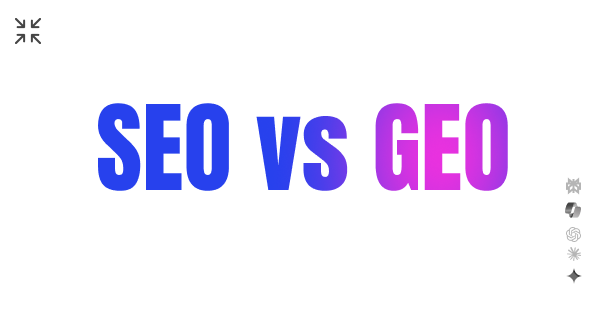SEO vs. Generative Engine Optimization (GEO), also called as AI SEO
- 23 Jun, 2025


Ever heard someone mention “SEO” and “GEO” (Generative Engine Optimization) and wondered what they’re talking about? They sound similar, but they’re worlds apart—one’s about boosting your online presence, the other’s about satellites orbiting Earth. Both are super powerful in their own way, shaping how we connect, communicate, and find information. Both are insanely powerful for getting your content seen, whether you’re running an e-commerce store or answering questions in a conversational AI world. Let’s unpack why these tools are game-changers, and how they shape the future of search.
Spoiler: they’re both game-changers ! 😎
Let’s start with definition and what is it… . SEO stands for Search Engine Optimization. It’s the art and science of making your website or content rank higher on search engines like Google. When someone searches “best coffee shops” or “how to fix a leaky faucet,” SEO helps your site show up near the top of the results. Here’s how it works in simple terms: Keywords: You use words or phrases people are searching for, like “easy yoga poses” in a fitness blog. **Quality Content: **You create helpful, well-written articles or videos that answer questions. **Tech Tricks: **You optimize things like page speed, mobile-friendliness, and links to make Google love your site. **Why care? **Good SEO means more clicks, more visitors, and more business.
On X, small business owners rave about it:
“Just tweaked my site’s SEO with better keywords and BOOM—double the traffic in a month!“ #SEOFTW”
But it’s not all smooth sailing. SEO takes time, and Google’s rules keep changing.
GEO, or Generative Engine Optimization, is about optimizing content for AI-driven platforms that answer questions in a conversational way, like ChatGPT, Grok, Perplexity, or Google’s AI Overviews. Effective Perplexity, Grok, Gemini, and Chat GPT optimization ensures your content is the one AI picks to answer queries like, “What’s the best budget laptop for students?” Instead of a list of links, these “generative engines” give direct, summarized answers, often pulling from websites, blogs, or forums. GEO is a big deal for businesses wanting to be the go-to answer in AI chats.
An X user experimenting with GEO shared:
“Tweaked my blog for GEO, and now my tips show up in AI answers on Perplexity! ” #AIRevolution
SEO, while crucial for e-commerce, also excels in content marketing and lead generation. GEO, essential for AI chats, is increasingly shaping how your content appears in summary answers across various platforms. These tools are your ticket to reaching customers in two different worlds. SEO dominates traditional search, putting your online store in front of shoppers typing queries into Google. GEO rules the rising tide of AI search, ensuring your expertise or products are featured in conversational answers. Together, they cover all bases in how people find information today.
Both are about being found where your audience is—Google for shoppers, AI chats for question-askers.
Imagine you sell custom mugs—SEO gets your store to the top when someone searches for “personalized coffee mugs.”
The result? More visitors, more orders. But staying on top takes work. Google’s updates can shuffle rankings, and bigger brands often dominate. Still, small shops with smart e-commerce SEO can compete.
GEO is your edge in the AI era, where people ask chatbots for advice instead of Googling. If you run a tech blog, GEO ensures your “Best Laptops for 2025” guide is summarized when someone asks an AI chatbot , “What laptop should I buy?” It’s perfect for businesses or creators wanting to be the trusted voice in AI answers. GEO tips include:
The aim? Not just to rank high, but to have AI engines cite, paraphrase, or highlight your content positively and accurately when users ask questions in your niche—whether it’s e-commerce products or expert advice. Learn more about optimizing product pages in our next post with AI SEO guide.
SEO for e-commerce, GEO for AI chats—they’re two sides of the same coin: visibility. SEO brings shoppers to your store through Google. GEO gets your brand or expertise into AI conversations, and boosting Your visibility in AI Engines. For example:
A customer asks ChatGPT, “Best sustainable clothing brands?” GEO ensures your eco-friendly apparel store is mentioned.
They then Google your brand name, and SEO makes your site rank first for the click-through.
 SEO and GEO – master them both! Together, they are game-changing strategies for your brand’s visibility in AI search.
SEO and GEO – master them both! Together, they are game-changing strategies for your brand’s visibility in AI search.
Both fields are powerful and evolving fast : SEO: AI tools are making keyword research smarter, and Google’s leaning into personalized results. E-commerce stores will need to focus on user experience (like fast checkouts) to stay ahead.
**GEO: **As AI search grows, GEO will get more sophisticated, with tricks like optimizing for voice assistants or visual AI answers.
“SEO and GEO are the future of marketing. AI search is huge, but Google is still king for e-commerce! ”#TechTrends
The AI search engine market is projected to grow from approximately USD 43.63 billion in 2025 to USD 108.88 billion by 2032, with a compound annual growth rate (CAGR) of about 14%. SEO’s algorithm shifts and GEO’s AI unpredictability keep everyone on their toes. But their power to connect you with customers is unmatched.
If you want to get more details how to boost your visibility you can check our next article: Invisible in AI Search? Mastering AI SEO: Guide to Boosting Your Brand’s Visibility in AI Search Engines .
Amplify Your Brand’s AI Presence and get your brand mentioned by ChatGPT, Claude, Perplexity, Grok and other AI search engines. Generate free report